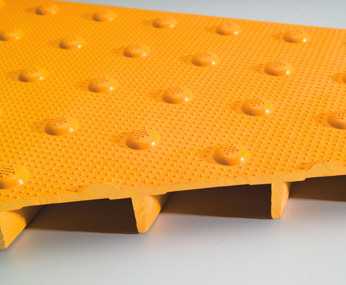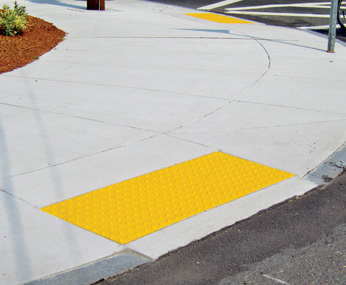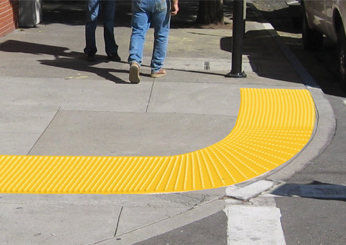Understanding the Different Types of ADA Tiles
When you need a way to increase accessibility and safety for visually impaired pedestrians, tactile paving is your solution. This system allows a pedestrian to detect a distinctive pattern underfoot, providing a warning of approaching hazards. These ADA-compliant tiles are available in a number of different types.
Where Can ADA Tiles Be Found?
The ADA tile system can be found virtually everywhere. Train, subway, and bus stations are required by law to use these tiles to ensure pedestrians remain a safe distance away from tracks and moving vehicles.
On city streets, tiles must be placed on corners to warn about upcoming street crossings. They are available in regular or curved detectable warning tiles. Way-finding surfaces like truncated dome surface tiles help to guide pedestrians across any walking surface.
Forms
ADA-compliant tiles are available in both regular and radius forms. The regular form is a rectangular shape, which is ideal for installation in straight lines, such as along the edge of a subway platform.
Radius systems are curved, which allows for installation along curbs, walkways, and other surfaces where tactile warnings are needed in order to avoid injury due to surface changes.
Pattern
ADA tile systems consist of truncated domes in various patterns. Truncated domes provide a surface that’s different from any other. This is a very important point, as this kind of distinct pattern will prevent pedestrians from confusing it with that of another surface, such as gravel. The truncated dome pattern also allows for the warning to occur as soon as the pedestrian feels it underfoot.
Installation Types
ADA tiles can be installed in three different ways. Each will have its advantages and disadvantages, depending on your climate, budget, and other specific requirements. There are three types of ADA tile: cast-in-place, surface applied, and cast-in-place replaceable.

Cast-in-Place
Cast-in-place radius tactile warning panels are a long-term warning system solution. They are made of iron or a composite material consisting of fiberglass, carbon, and homogeneous glass. Each tile features embedment ribs to secure the tile, which is pressed into freshly poured concrete.
Applications for Cast-in-Place Tiles
These tiles are ideal for virtually any climate or application, whether private or public. The product provides pedestrians with an instant warning that a potentially hazardous condition is near. The cast-in-place tile can be seen in locations where the surface transitions from one type to another, such as from a ramp to the sidewalk or from a sidewalk to an intersection.
Cast-in-place tiles are also used where conditions may otherwise be too dangerous for a visually impaired pedestrian to access without assistance. Examples of these can be stair landings, parking lots, or public transportation platforms where permanent warnings are needed.
Benefits
This type of tile does not require any painting to maintain its color, as the cast-in-place product is colored throughout for long-term color-fastness. In addition to Seattle Yellow, this option is available in eight additional colors, all of them ADA approved.
Disadvantages
Tiles of this type can only be installed in fresh concrete. In order to remove them, complete demolition is needed and new concrete poured in order to install new tiles. As a result, this type of tile takes the longest to install and remove.
Surface Applied
The surface-applied tile can either be used to fit onto existing hardened concrete or installed onto new concrete. This lightweight product is made of exterior-grade fiberglass polymer composite material that is both UV stable and colorfast. They also contain beveled edges to create a seamless transition.
Applications for Surface-Applied Tiles
Surface-applied radius tactile panels are best for applications where it isn’t feasible, cost-effective, or necessary to replace concrete. As a result, they can be installed on entryways, ramps, and sidewalks of local businesses, as well as in front of government buildings. They can also be installed in parking lots and on streets and ramps.
Benefits
This product offers more than one option for installation, as it can be inserted into new concrete as well as installed over existing concrete. Secure installation is another benefit; surface-applied tiles have both color-matched fasteners and structural adhesive to ensure a reliable and long-term fit.
Because they are designed to be placed on top of concrete, surface-applied tiles take only a few minutes to install. Should the need arise to remove this type of tile, all that’s required is to break it apart and remove the pieces.
Disadvantages
Depending on the heaviness of traffic, these tiles may need to be replaced more often than other types. They also require time to ensure that the tile is mounted properly so that slippage and separation can be prevented.

Cast-in-Place Replaceable
Cast-in-place replaceable tiles allow for the top part of the tile to be replaced when needed, but without having to demolish the underlying concrete. Also called “wet set,” this product is versatile, allowing for placement in many areas.
Applications for Cast-in-Place Replaceable Tiles
These tiles can be installed on wheelchair ramps, in vehicular passageways, and at escalator approaches. They are also ideal for areas where a visual warning to sighted pedestrians is also needed.
Benefits
The cast-in-place replaceable tile uses a simple bolt system that allows fast and easy removal when needed. To do so, simply loosen the bolts and lift the old panel off, reversing the procedure for the new panel. A major benefit of this product is that tiles can include messages and artwork so that sighted passengers can also receive warnings.
Any images placed on these replaceable tiles can be of photographic quality. As well, artwork can contain up to four colors, and they are available in a range of five sizes. Messages and artwork can span a series of tiles or be placed on a single tile. Finally, the cast-in-place replaceable tiles offer high cost-effectiveness, as only the top pieces need to be ordered when replacement is needed.
Disadvantages
Because they are replaceable, it takes time to ensure that the new tiles are positioned and secured properly each time the old tiles need replacing. This can mean a significant amount of installation time for large areas.
Finding the Right ADA Tile
Although much information about radius tactile detectable warning tiles exists, it can still be difficult to know which one is right for your application. Where this is the case, it’s important to ensure you are getting the right information. Therefore, a knowledgeable staff that can offer expert advice is absolutely essential.
The company you choose should, of course, offer only ADA-compliant products, and the quality of the products you purchase from them should be the highest possible to add the most value to your investment. In terms of pricing, your chosen company should offer prices lower than its competitors, but not at the cost of quality.
You should also be able to get the tiles you ordered within a reasonable amount of time. A warranty will communicate that the company you’ve chosen stands behind their customers and their products.
Superior ADA-Compliant Tiles for Your Application
ADA Solutions prides itself on producing high-quality and durable detectable warning surface tiles. We are able to accomplish this with a sophisticated quality management system at every stage of production. All of our products are manufactured using long-strand fiberglass, which is dispersed evenly through both the tile base and its truncated domes.
We are the leading manufacturer of curved detectable warning panels. Thanks to our large distribution network, ADA Solutions is able to ship your tiles within 6 to 36 business hours following receipt of your order.
All of our products are competitively priced and include a 7-year warranty, the longest in the industry. Discover the difference that working with ADA Solutions can make to your detectable warning panel installation. Call us to request your free quote: 1-800-372-0519.




